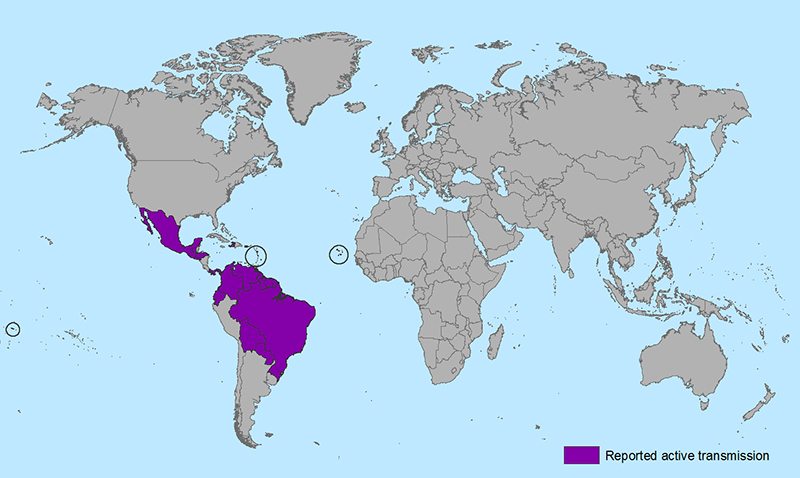The Zika virus, up until recently, was a little known member of the flavivirus family – the same family that consists of harrowing diseases like yellow fever, West Nile, chikungunya and dengue fever.
What makes Zika different however, is that there is no known vaccine to prevent the virus or treat the infection.
According to WHO “one out of four people may not develop symptoms, but in those who are affected the disease is usually mild with symptoms that can last between two and seven days. Its clinical manifestation is often similar to dengue, also a mosquito-borne illness.”
The virus, transmitted by the aggressive Aedes aegypti mosquito has now spread to over 25 countries according to the Centers of Disease Control.
“That’s a pandemic in progress,” said Dr. Anthony Fauci, director of the National Institute of Allergy and Infectious Diseases at the National Institutes of Health. “It isn’t as if it’s turning around and dying out, it’s getting worse and worse as the days go by.”
The virus began gathering international attention after an alarming connection was made between it and microcephaly – a neurological disorder that causes birth defects such as abnormally small craniums, developmental issues and sometimes death.

In 2014 there were 146 cases in Brazil, one of the most heavily affected areas so far. Whilst these numbers are alarming, since November, Brazil has seen a frightening increase in women who were infected during pregnancy, with almost 4,000 cases of microcephaly being reported. So far, 46 babies have died from the disease.
The rapidly spreading virus has caused such concern in Latin America that governmental agencies have asked women to avoid pregnancies for at least six to eight months, or at least until the virus is contained.
“We are doing this because I believe it’s a good way to communicate the risk, to tell people that there could be serious consequences,” says Alejandro Gaviria, Colombia’s health minister.
In El Salvador, the health ministry is urging women to avoid falling pregnant until 2018. The same warning has been applied to women in Jamaica and Brazil, with the latter reporting an alarming 3,893 suspected microcephaly cases alone.
A travel warning for pregnant women has also been announced for Puerto Rico, Brazil, Colombia, El Salvador, French Guiana, Guatemala, Haiti, Honduras, Martinique, Mexico, Panama, Paraguay and Suriname.

How is Zika spread?
The arbovirus is spread through the Aedes mosquito when the bug bites a person who is infected. The infection is then carried by the same mosquito who infects others through continued biting. Because the symptoms are mild and sometimes not present it is difficult to diagnose.
Documented transmission has also been reported during labour, blood transfusions and sexual contact as well as exposure through laboratory experimentation.
“What we now know,” Dr. Lyle Petersen, director of the CDC’s Division of Vector-Borne Diseases, told BBC, “is that fetuses can be infected with the virus. That’s not new for infectious diseases, but it is new for this virus.”
“This is a very remarkable and unusual situation,” agreed Fauci, “because the other flaviviruses don’t do that to our knowledge. You just don’t see that with dengue or West Nile or chikungunya.”

How is the virus being subdued?
Governments and researchers are currently attempting to discover a vaccine and treatment for the virus around the world. Until then, mosquito control regulations are beginning to take place through pesticide usage and the eradication of water receptacles – a breeding ground for mosquitos.
However, these techniques, whilst a good first step, are only proving to be marginally effective as the mosquitos have the ability to breed rapidly in the smallest amounts of water. This makes them particularly hard to find and destroy.
Field trials using the “mutant mosquito” began in 2011 and were successful according to Oxitec, the company who instigated the trials.
The genetically modified Aedes aegypti also known as OX513A, is designed to pass along a gene to other mosquitos which kills future offspring before birth. This works on the theory that mosquitoes only mate once and therefore by denying their procreation, the slowing of the virus could potentially occur.
For more information visit the World Health Organisation website.







